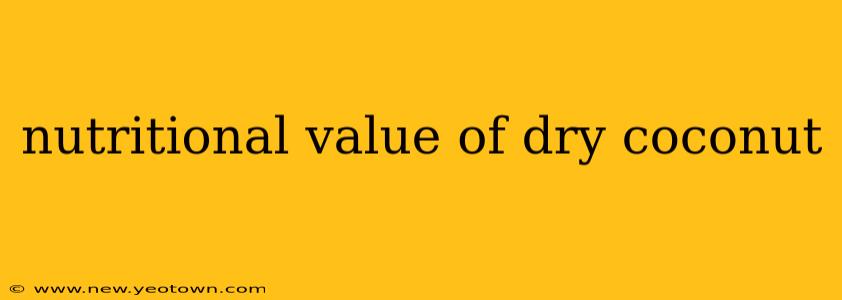The humble coconut, often associated with tropical beaches and exotic cocktails, holds a surprising nutritional punch, especially in its dried form. Dry coconut, whether shredded, flaked, or in the form of desiccated coconut, packs a powerful array of vitamins, minerals, and healthy fats, making it a valuable addition to a balanced diet. But let's unravel the specifics, exploring its nutritional profile and addressing some common questions.
What are the nutritional benefits of dried coconut?
Dried coconut is a nutritional powerhouse, brimming with healthy fats, fiber, and essential minerals. The primary benefit lies in its high concentration of medium-chain triglycerides (MCTs), a type of saturated fat that the body metabolizes differently than long-chain triglycerides found in other fats. MCTs are quickly converted into energy, supporting metabolic function and potentially aiding in weight management. Beyond MCTs, dry coconut provides:
- Fiber: Crucial for digestive health, promoting regularity and supporting a healthy gut microbiome.
- Manganese: Essential for bone health, wound healing, and metabolism.
- Copper: Plays a vital role in energy production and maintaining a healthy nervous system.
- Iron: Essential for oxygen transport throughout the body.
- Potassium: Important for maintaining healthy blood pressure.
Is dried coconut good for weight loss?
This is a common question, and the answer is nuanced. While dried coconut is rich in healthy fats and fiber, it's also calorie-dense. The high fiber content can promote satiety, potentially reducing overall calorie intake. However, moderation is key. Consuming large quantities can negate any potential weight loss benefits due to the high calorie count. The key is incorporating it strategically into a balanced diet and exercise regimen.
How many calories are in dried coconut?
The calorie count in dried coconut varies depending on the type and preparation. Generally, a one-ounce serving (approximately 28 grams) of unsweetened shredded coconut contains around 125-150 calories. However, sweetened versions will have significantly more calories due to added sugar. Always check the nutrition label for accurate calorie information.
What are the health risks associated with eating too much dried coconut?
While generally healthy, consuming excessive amounts of dried coconut can lead to some potential health concerns:
- High Calorie Intake: As mentioned, its calorie density can contribute to weight gain if consumed in excess.
- High Saturated Fat: Although containing healthy MCTs, the overall saturated fat content is still relatively high. Excessive consumption might negatively impact cholesterol levels in some individuals.
- Potential for Allergic Reactions: Coconut allergies, though less common than other nut allergies, do exist.
Is dried coconut good for your skin?
Anecdotal evidence and some preliminary research suggest potential benefits for skin health. The fatty acids and antioxidants in coconut may contribute to hydration and improved skin elasticity. However, more rigorous research is needed to confirm these benefits.
Can I use dried coconut in baking?
Absolutely! Dried coconut is a versatile ingredient frequently used in baking. It adds a delicious flavor and texture to various recipes, from cakes and cookies to muffins and bread. Remember to consider the added calories and sugar content when using sweetened coconut flakes in baking.
In conclusion, dried coconut is a nutritious and versatile ingredient that can enhance both culinary creations and overall well-being. However, mindful consumption, balanced with a healthy diet and lifestyle, is crucial to reap its benefits without any drawbacks. Remember to always read nutrition labels and consult a healthcare professional if you have specific dietary concerns or allergies.

